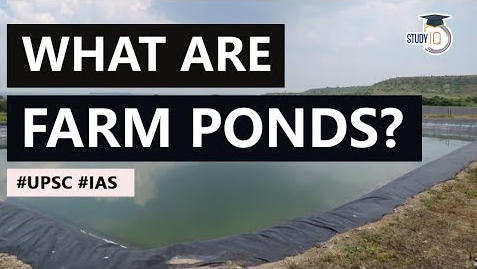Table of Contents
Context
- Prime Minister Narendra Modi talked about the need to implement innovative water management measures, stressing particularly the importance of rainwater harvesting both at the household and community levels.
- One intervention that has been tried out in various States, and needs to be taken up on a bigger scale, is the construction of farm ponds.
Issue
- With an increased variability of monsoons and rapidly depleting groundwater tables, large parts of India are reeling under water stress.
- A number of peninsular regions like Bundelkhand, Vidarbha and Marathwada have been facing recurring drought-like situations.
Benefits
- Cost-effective structures
- Enhances water control
- These ponds are a financially viable plan
- However, this is possible only if they act as rainwater harvesting structures and not as intermediate storage points
Recent Reports
- Farm ponds aid in superior water
- Some of them functioned exclusively as recharge points
- They also helped in providing supplemental irrigation
- The yield of paddy stabilised
Capacity
- Farm ponds can retain water for 8-10 months of the year.
- Cropping intensity and crop diversification
- Increase in area used to cultivate vegetables and other commercial crops.
Other provisions
- Maharashtra government is promoting farm ponds
- However, most of them are being constructed without inlet and outlet provisions
- They cannot arrest the excess
- Further, farmers line them at the bottom with plastic
- Such farm ponds have an adverse impact on the water tables
Way ahead
- Intensify competition for extraction of groundwater from the aquifer.
- In such cases, farmers fill up their farm ponds first
- This can obstruct the circulation of water.
- During canal rotation, the aquifer will get recharged
- This return flow benefits all
- But if canals fill up the farm ponds first, it restricts their benefits only to the pond owners.
- Overall, farm ponds can act as effective harvesting structures and also yield healthy financial returns.
- But if they are promoted merely for onfarm storage of groundwater and canal water, they could accelerate, rather than reduce, the water crisis in the countryside
Latest Burning Issues | Free PDF






















 WhatsApp
WhatsApp